Enhancing Lives through International Water Laws
VerifiedAdded on 2019/10/18
|7
|2219
|222
Report
AI Summary
The assignment content discusses the laws governing international waters, including territorial waters, exclusive economic zones, and high seas. It highlights the importance of understanding coastline and territorial waters, as well as the regulations outlined in the United Nations Convention on the Law of the Sea (UNCLOS). The article also touches upon transboundary water disputes, such as the South China Sea and the Arctic Ocean, and emphasizes the need for effective ocean governance to manage high seas efficiently. Finally, it highlights some important points to consider when dealing with international waters, including the jurisdictional boundaries of different countries.
Contribute Materials
Your contribution can guide someone’s learning journey. Share your
documents today.
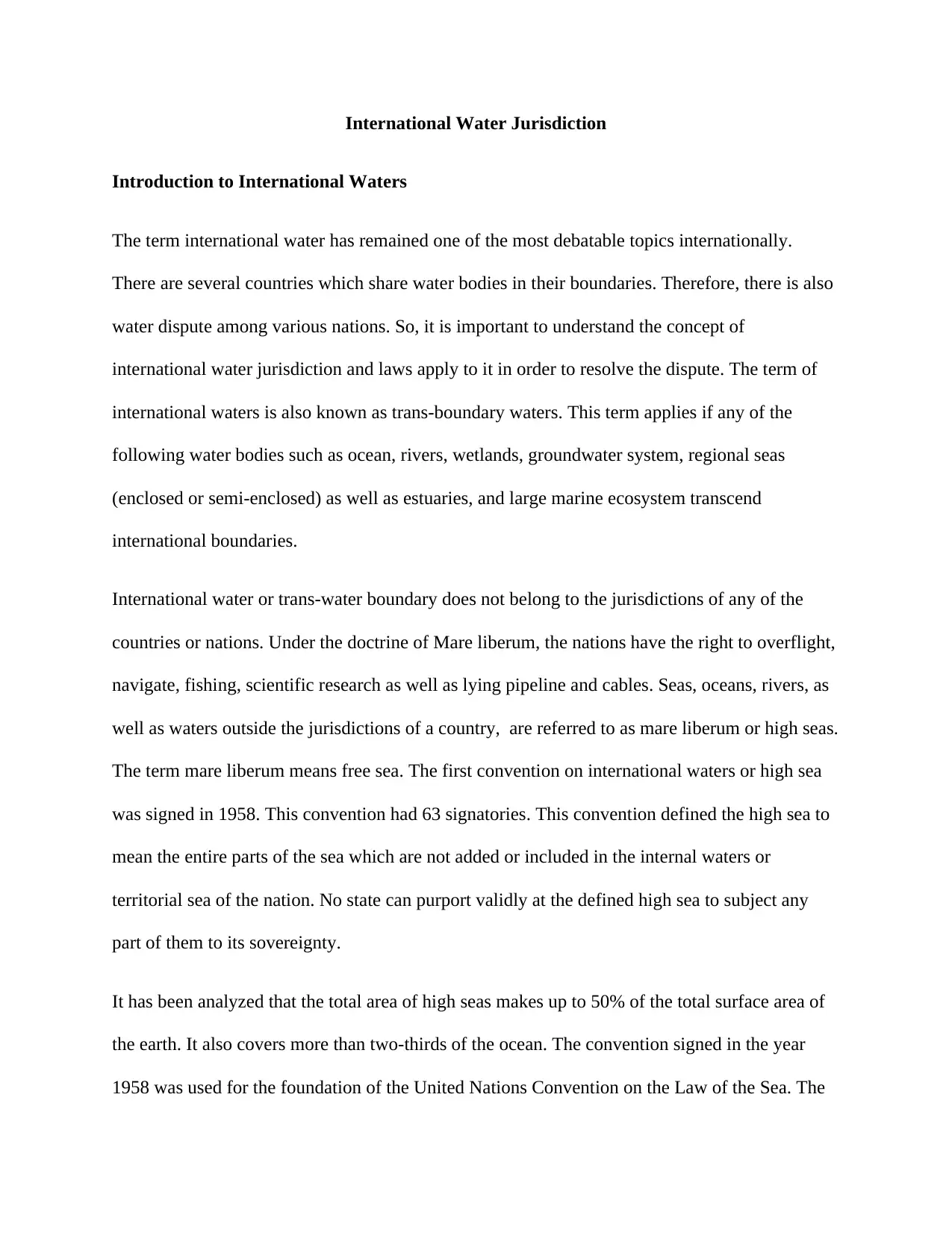
International Water Jurisdiction
Introduction to International Waters
The term international water has remained one of the most debatable topics internationally.
There are several countries which share water bodies in their boundaries. Therefore, there is also
water dispute among various nations. So, it is important to understand the concept of
international water jurisdiction and laws apply to it in order to resolve the dispute. The term of
international waters is also known as trans-boundary waters. This term applies if any of the
following water bodies such as ocean, rivers, wetlands, groundwater system, regional seas
(enclosed or semi-enclosed) as well as estuaries, and large marine ecosystem transcend
international boundaries.
International water or trans-water boundary does not belong to the jurisdictions of any of the
countries or nations. Under the doctrine of Mare liberum, the nations have the right to overflight,
navigate, fishing, scientific research as well as lying pipeline and cables. Seas, oceans, rivers, as
well as waters outside the jurisdictions of a country, are referred to as mare liberum or high seas.
The term mare liberum means free sea. The first convention on international waters or high sea
was signed in 1958. This convention had 63 signatories. This convention defined the high sea to
mean the entire parts of the sea which are not added or included in the internal waters or
territorial sea of the nation. No state can purport validly at the defined high sea to subject any
part of them to its sovereignty.
It has been analyzed that the total area of high seas makes up to 50% of the total surface area of
the earth. It also covers more than two-thirds of the ocean. The convention signed in the year
1958 was used for the foundation of the United Nations Convention on the Law of the Sea. The
Introduction to International Waters
The term international water has remained one of the most debatable topics internationally.
There are several countries which share water bodies in their boundaries. Therefore, there is also
water dispute among various nations. So, it is important to understand the concept of
international water jurisdiction and laws apply to it in order to resolve the dispute. The term of
international waters is also known as trans-boundary waters. This term applies if any of the
following water bodies such as ocean, rivers, wetlands, groundwater system, regional seas
(enclosed or semi-enclosed) as well as estuaries, and large marine ecosystem transcend
international boundaries.
International water or trans-water boundary does not belong to the jurisdictions of any of the
countries or nations. Under the doctrine of Mare liberum, the nations have the right to overflight,
navigate, fishing, scientific research as well as lying pipeline and cables. Seas, oceans, rivers, as
well as waters outside the jurisdictions of a country, are referred to as mare liberum or high seas.
The term mare liberum means free sea. The first convention on international waters or high sea
was signed in 1958. This convention had 63 signatories. This convention defined the high sea to
mean the entire parts of the sea which are not added or included in the internal waters or
territorial sea of the nation. No state can purport validly at the defined high sea to subject any
part of them to its sovereignty.
It has been analyzed that the total area of high seas makes up to 50% of the total surface area of
the earth. It also covers more than two-thirds of the ocean. The convention signed in the year
1958 was used for the foundation of the United Nations Convention on the Law of the Sea. The
Secure Best Marks with AI Grader
Need help grading? Try our AI Grader for instant feedback on your assignments.
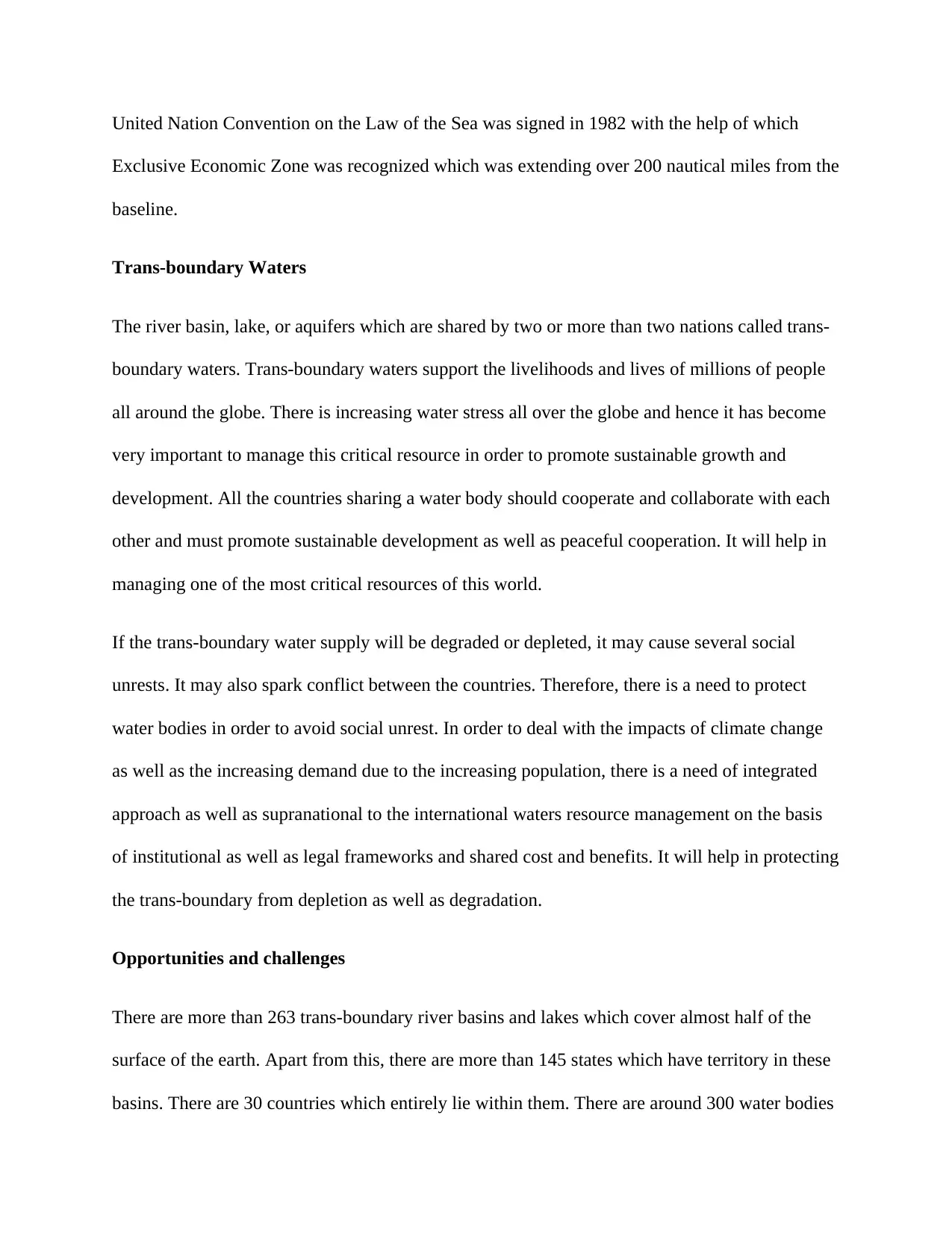
United Nation Convention on the Law of the Sea was signed in 1982 with the help of which
Exclusive Economic Zone was recognized which was extending over 200 nautical miles from the
baseline.
Trans-boundary Waters
The river basin, lake, or aquifers which are shared by two or more than two nations called trans-
boundary waters. Trans-boundary waters support the livelihoods and lives of millions of people
all around the globe. There is increasing water stress all over the globe and hence it has become
very important to manage this critical resource in order to promote sustainable growth and
development. All the countries sharing a water body should cooperate and collaborate with each
other and must promote sustainable development as well as peaceful cooperation. It will help in
managing one of the most critical resources of this world.
If the trans-boundary water supply will be degraded or depleted, it may cause several social
unrests. It may also spark conflict between the countries. Therefore, there is a need to protect
water bodies in order to avoid social unrest. In order to deal with the impacts of climate change
as well as the increasing demand due to the increasing population, there is a need of integrated
approach as well as supranational to the international waters resource management on the basis
of institutional as well as legal frameworks and shared cost and benefits. It will help in protecting
the trans-boundary from depletion as well as degradation.
Opportunities and challenges
There are more than 263 trans-boundary river basins and lakes which cover almost half of the
surface of the earth. Apart from this, there are more than 145 states which have territory in these
basins. There are 30 countries which entirely lie within them. There are around 300 water bodies
Exclusive Economic Zone was recognized which was extending over 200 nautical miles from the
baseline.
Trans-boundary Waters
The river basin, lake, or aquifers which are shared by two or more than two nations called trans-
boundary waters. Trans-boundary waters support the livelihoods and lives of millions of people
all around the globe. There is increasing water stress all over the globe and hence it has become
very important to manage this critical resource in order to promote sustainable growth and
development. All the countries sharing a water body should cooperate and collaborate with each
other and must promote sustainable development as well as peaceful cooperation. It will help in
managing one of the most critical resources of this world.
If the trans-boundary water supply will be degraded or depleted, it may cause several social
unrests. It may also spark conflict between the countries. Therefore, there is a need to protect
water bodies in order to avoid social unrest. In order to deal with the impacts of climate change
as well as the increasing demand due to the increasing population, there is a need of integrated
approach as well as supranational to the international waters resource management on the basis
of institutional as well as legal frameworks and shared cost and benefits. It will help in protecting
the trans-boundary from depletion as well as degradation.
Opportunities and challenges
There are more than 263 trans-boundary river basins and lakes which cover almost half of the
surface of the earth. Apart from this, there are more than 145 states which have territory in these
basins. There are 30 countries which entirely lie within them. There are around 300 water bodies
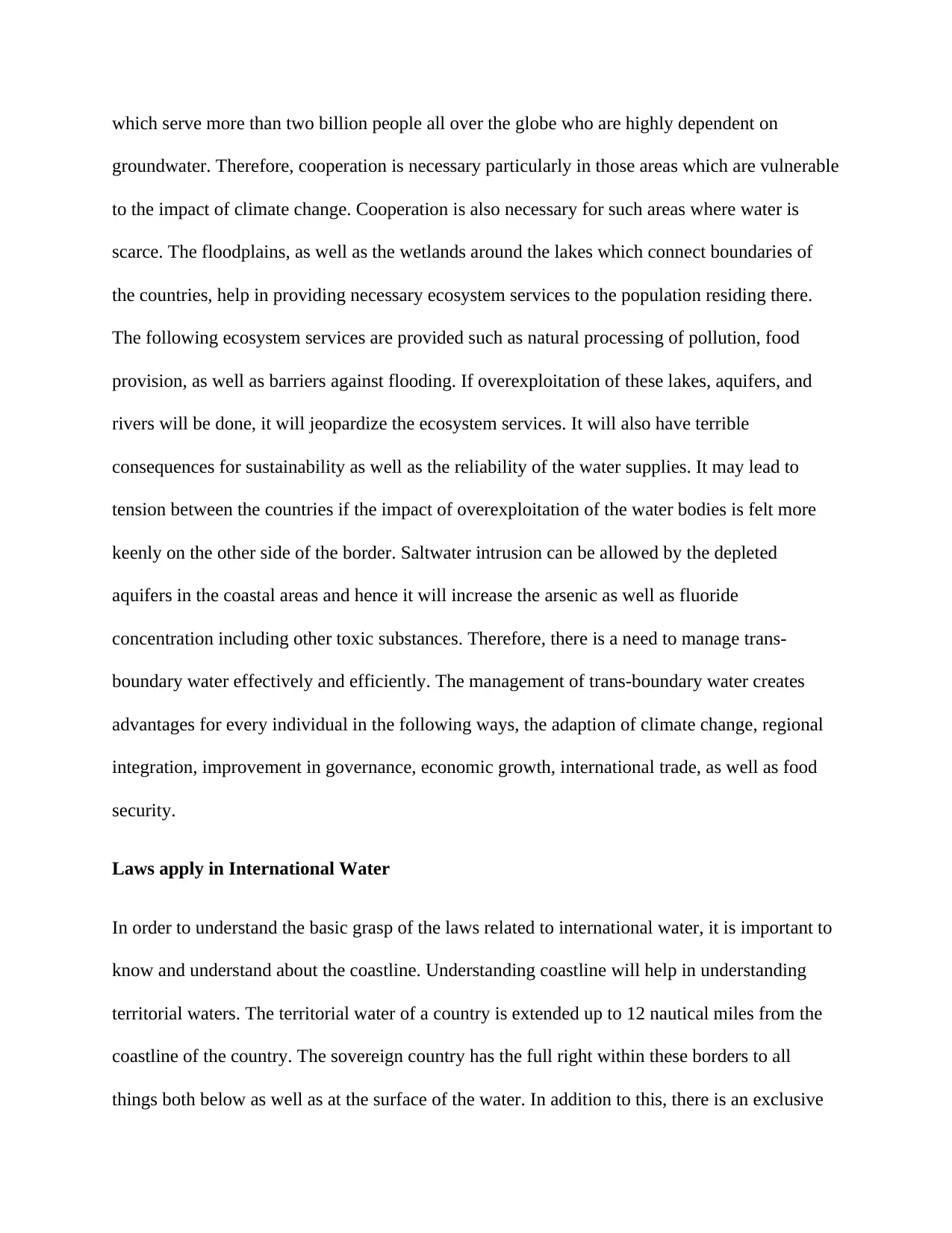
which serve more than two billion people all over the globe who are highly dependent on
groundwater. Therefore, cooperation is necessary particularly in those areas which are vulnerable
to the impact of climate change. Cooperation is also necessary for such areas where water is
scarce. The floodplains, as well as the wetlands around the lakes which connect boundaries of
the countries, help in providing necessary ecosystem services to the population residing there.
The following ecosystem services are provided such as natural processing of pollution, food
provision, as well as barriers against flooding. If overexploitation of these lakes, aquifers, and
rivers will be done, it will jeopardize the ecosystem services. It will also have terrible
consequences for sustainability as well as the reliability of the water supplies. It may lead to
tension between the countries if the impact of overexploitation of the water bodies is felt more
keenly on the other side of the border. Saltwater intrusion can be allowed by the depleted
aquifers in the coastal areas and hence it will increase the arsenic as well as fluoride
concentration including other toxic substances. Therefore, there is a need to manage trans-
boundary water effectively and efficiently. The management of trans-boundary water creates
advantages for every individual in the following ways, the adaption of climate change, regional
integration, improvement in governance, economic growth, international trade, as well as food
security.
Laws apply in International Water
In order to understand the basic grasp of the laws related to international water, it is important to
know and understand about the coastline. Understanding coastline will help in understanding
territorial waters. The territorial water of a country is extended up to 12 nautical miles from the
coastline of the country. The sovereign country has the full right within these borders to all
things both below as well as at the surface of the water. In addition to this, there is an exclusive
groundwater. Therefore, cooperation is necessary particularly in those areas which are vulnerable
to the impact of climate change. Cooperation is also necessary for such areas where water is
scarce. The floodplains, as well as the wetlands around the lakes which connect boundaries of
the countries, help in providing necessary ecosystem services to the population residing there.
The following ecosystem services are provided such as natural processing of pollution, food
provision, as well as barriers against flooding. If overexploitation of these lakes, aquifers, and
rivers will be done, it will jeopardize the ecosystem services. It will also have terrible
consequences for sustainability as well as the reliability of the water supplies. It may lead to
tension between the countries if the impact of overexploitation of the water bodies is felt more
keenly on the other side of the border. Saltwater intrusion can be allowed by the depleted
aquifers in the coastal areas and hence it will increase the arsenic as well as fluoride
concentration including other toxic substances. Therefore, there is a need to manage trans-
boundary water effectively and efficiently. The management of trans-boundary water creates
advantages for every individual in the following ways, the adaption of climate change, regional
integration, improvement in governance, economic growth, international trade, as well as food
security.
Laws apply in International Water
In order to understand the basic grasp of the laws related to international water, it is important to
know and understand about the coastline. Understanding coastline will help in understanding
territorial waters. The territorial water of a country is extended up to 12 nautical miles from the
coastline of the country. The sovereign country has the full right within these borders to all
things both below as well as at the surface of the water. In addition to this, there is an exclusive
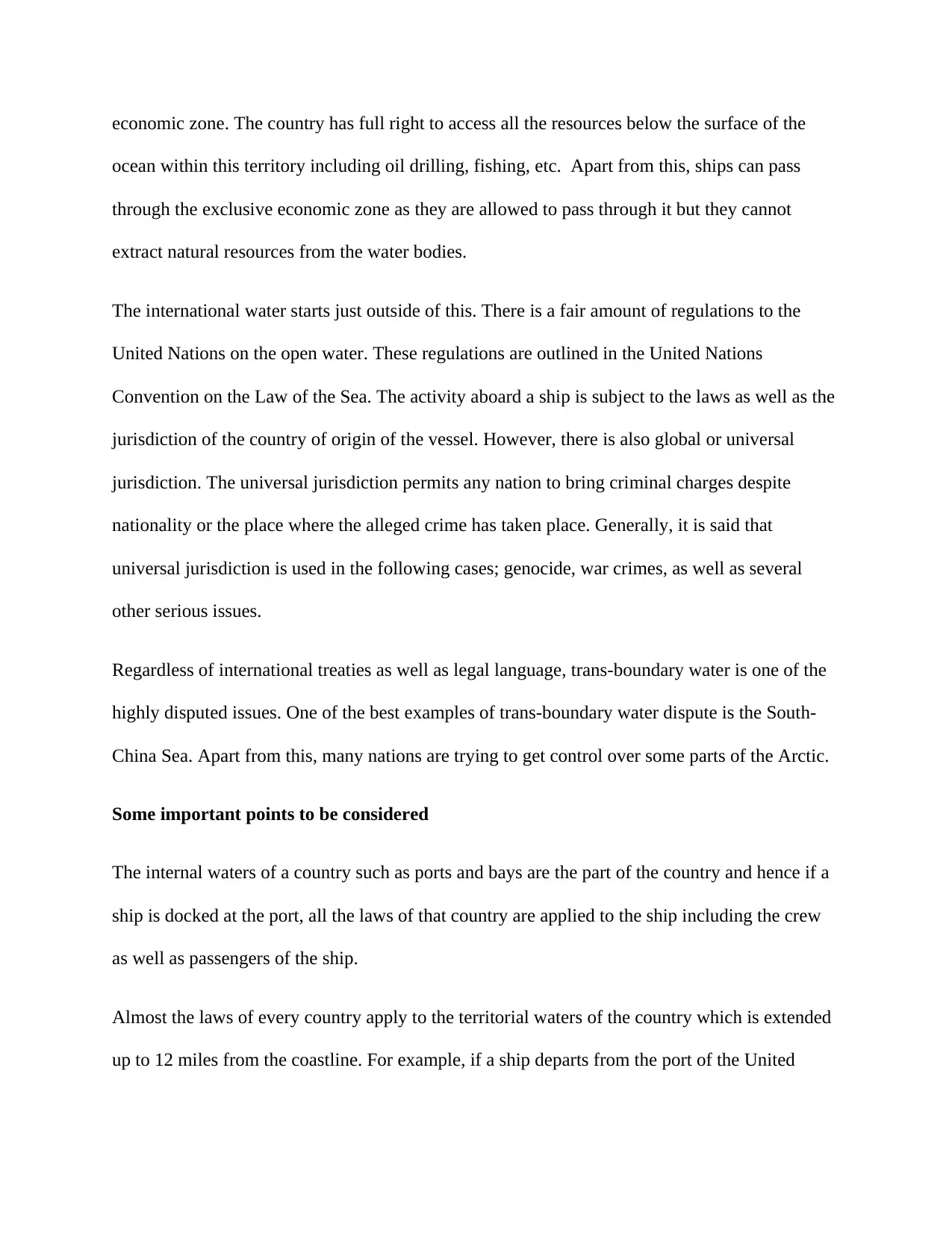
economic zone. The country has full right to access all the resources below the surface of the
ocean within this territory including oil drilling, fishing, etc. Apart from this, ships can pass
through the exclusive economic zone as they are allowed to pass through it but they cannot
extract natural resources from the water bodies.
The international water starts just outside of this. There is a fair amount of regulations to the
United Nations on the open water. These regulations are outlined in the United Nations
Convention on the Law of the Sea. The activity aboard a ship is subject to the laws as well as the
jurisdiction of the country of origin of the vessel. However, there is also global or universal
jurisdiction. The universal jurisdiction permits any nation to bring criminal charges despite
nationality or the place where the alleged crime has taken place. Generally, it is said that
universal jurisdiction is used in the following cases; genocide, war crimes, as well as several
other serious issues.
Regardless of international treaties as well as legal language, trans-boundary water is one of the
highly disputed issues. One of the best examples of trans-boundary water dispute is the South-
China Sea. Apart from this, many nations are trying to get control over some parts of the Arctic.
Some important points to be considered
The internal waters of a country such as ports and bays are the part of the country and hence if a
ship is docked at the port, all the laws of that country are applied to the ship including the crew
as well as passengers of the ship.
Almost the laws of every country apply to the territorial waters of the country which is extended
up to 12 miles from the coastline. For example, if a ship departs from the port of the United
ocean within this territory including oil drilling, fishing, etc. Apart from this, ships can pass
through the exclusive economic zone as they are allowed to pass through it but they cannot
extract natural resources from the water bodies.
The international water starts just outside of this. There is a fair amount of regulations to the
United Nations on the open water. These regulations are outlined in the United Nations
Convention on the Law of the Sea. The activity aboard a ship is subject to the laws as well as the
jurisdiction of the country of origin of the vessel. However, there is also global or universal
jurisdiction. The universal jurisdiction permits any nation to bring criminal charges despite
nationality or the place where the alleged crime has taken place. Generally, it is said that
universal jurisdiction is used in the following cases; genocide, war crimes, as well as several
other serious issues.
Regardless of international treaties as well as legal language, trans-boundary water is one of the
highly disputed issues. One of the best examples of trans-boundary water dispute is the South-
China Sea. Apart from this, many nations are trying to get control over some parts of the Arctic.
Some important points to be considered
The internal waters of a country such as ports and bays are the part of the country and hence if a
ship is docked at the port, all the laws of that country are applied to the ship including the crew
as well as passengers of the ship.
Almost the laws of every country apply to the territorial waters of the country which is extended
up to 12 miles from the coastline. For example, if a ship departs from the port of the United
Secure Best Marks with AI Grader
Need help grading? Try our AI Grader for instant feedback on your assignments.
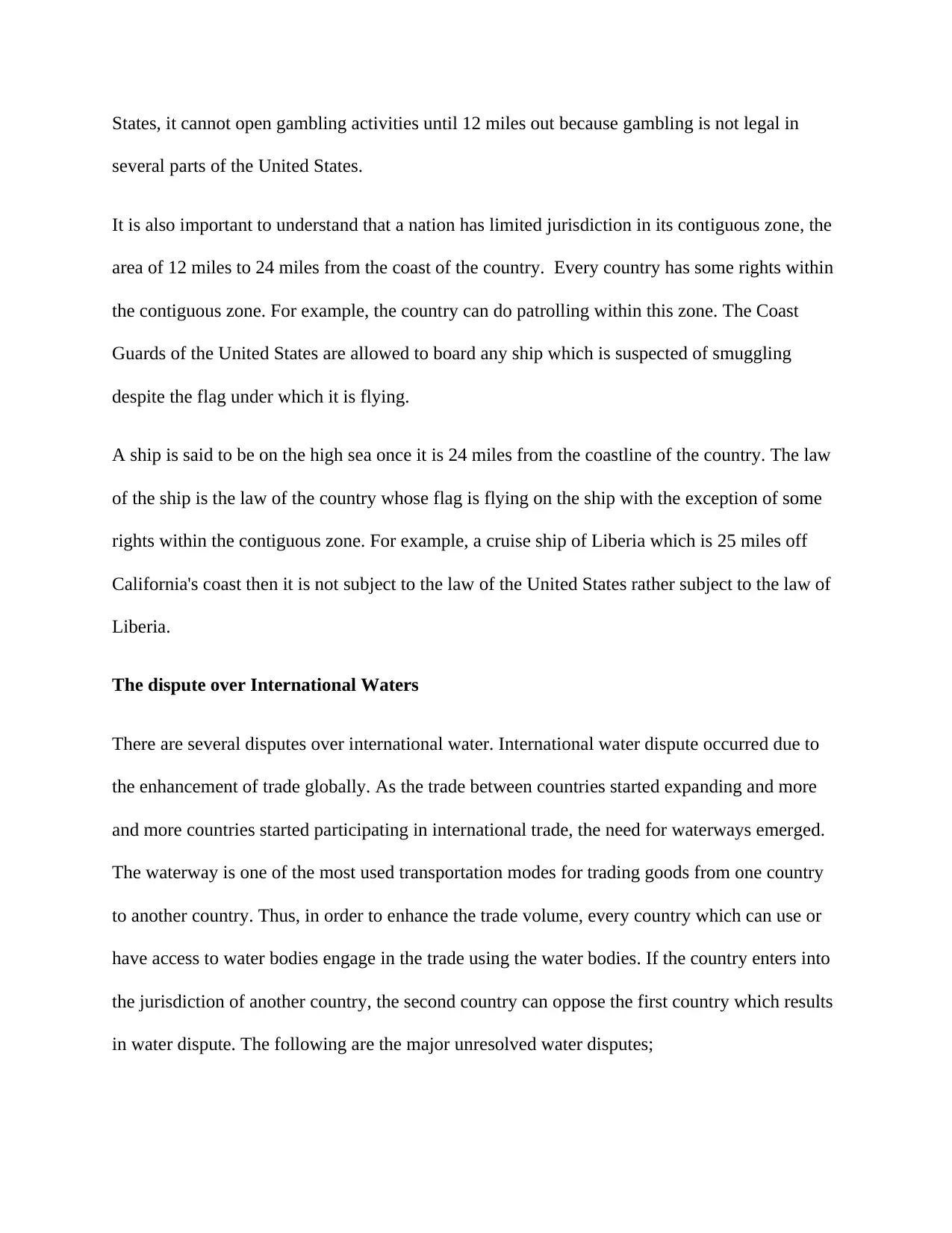
States, it cannot open gambling activities until 12 miles out because gambling is not legal in
several parts of the United States.
It is also important to understand that a nation has limited jurisdiction in its contiguous zone, the
area of 12 miles to 24 miles from the coast of the country. Every country has some rights within
the contiguous zone. For example, the country can do patrolling within this zone. The Coast
Guards of the United States are allowed to board any ship which is suspected of smuggling
despite the flag under which it is flying.
A ship is said to be on the high sea once it is 24 miles from the coastline of the country. The law
of the ship is the law of the country whose flag is flying on the ship with the exception of some
rights within the contiguous zone. For example, a cruise ship of Liberia which is 25 miles off
California's coast then it is not subject to the law of the United States rather subject to the law of
Liberia.
The dispute over International Waters
There are several disputes over international water. International water dispute occurred due to
the enhancement of trade globally. As the trade between countries started expanding and more
and more countries started participating in international trade, the need for waterways emerged.
The waterway is one of the most used transportation modes for trading goods from one country
to another country. Thus, in order to enhance the trade volume, every country which can use or
have access to water bodies engage in the trade using the water bodies. If the country enters into
the jurisdiction of another country, the second country can oppose the first country which results
in water dispute. The following are the major unresolved water disputes;
several parts of the United States.
It is also important to understand that a nation has limited jurisdiction in its contiguous zone, the
area of 12 miles to 24 miles from the coast of the country. Every country has some rights within
the contiguous zone. For example, the country can do patrolling within this zone. The Coast
Guards of the United States are allowed to board any ship which is suspected of smuggling
despite the flag under which it is flying.
A ship is said to be on the high sea once it is 24 miles from the coastline of the country. The law
of the ship is the law of the country whose flag is flying on the ship with the exception of some
rights within the contiguous zone. For example, a cruise ship of Liberia which is 25 miles off
California's coast then it is not subject to the law of the United States rather subject to the law of
Liberia.
The dispute over International Waters
There are several disputes over international water. International water dispute occurred due to
the enhancement of trade globally. As the trade between countries started expanding and more
and more countries started participating in international trade, the need for waterways emerged.
The waterway is one of the most used transportation modes for trading goods from one country
to another country. Thus, in order to enhance the trade volume, every country which can use or
have access to water bodies engage in the trade using the water bodies. If the country enters into
the jurisdiction of another country, the second country can oppose the first country which results
in water dispute. The following are the major unresolved water disputes;
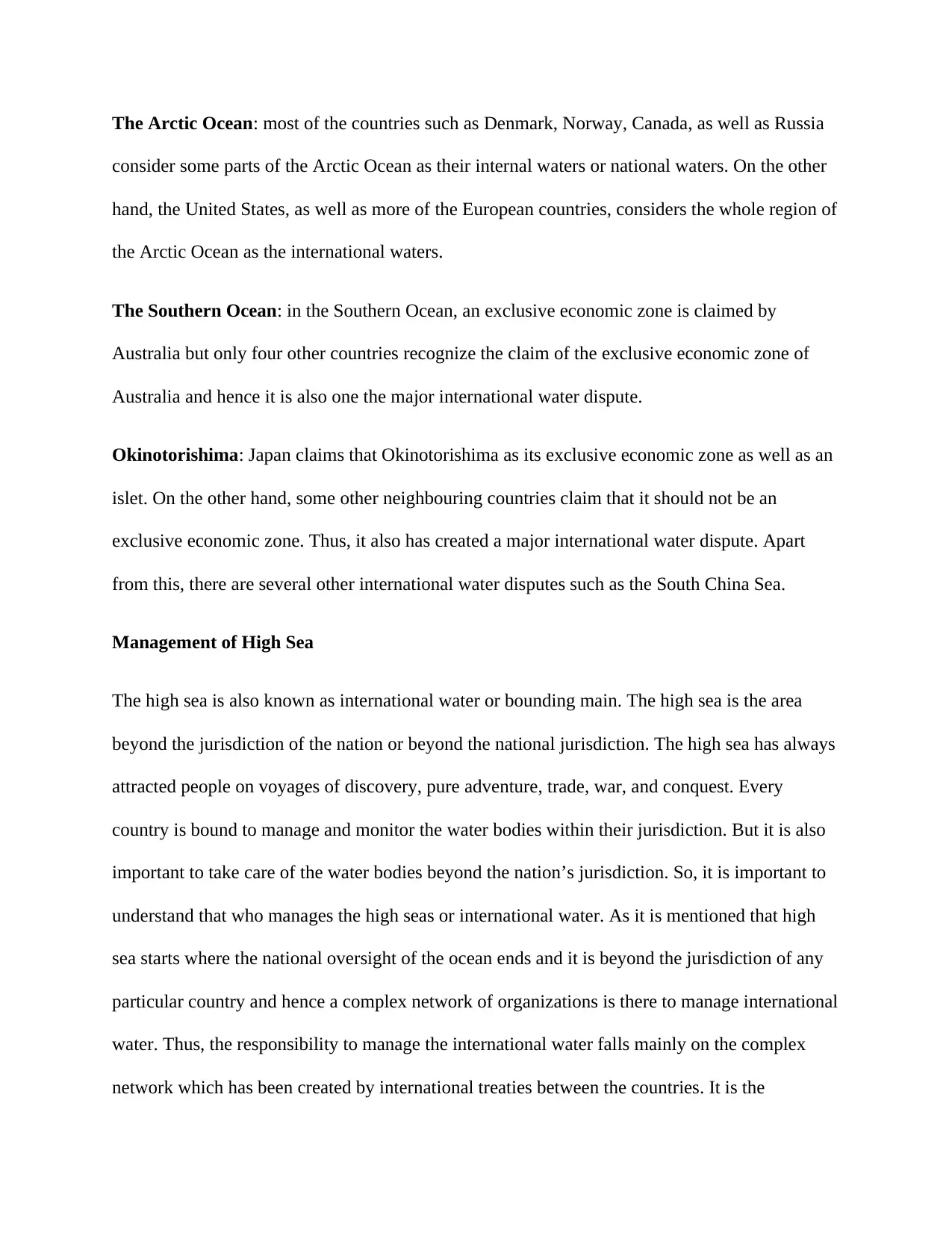
The Arctic Ocean: most of the countries such as Denmark, Norway, Canada, as well as Russia
consider some parts of the Arctic Ocean as their internal waters or national waters. On the other
hand, the United States, as well as more of the European countries, considers the whole region of
the Arctic Ocean as the international waters.
The Southern Ocean: in the Southern Ocean, an exclusive economic zone is claimed by
Australia but only four other countries recognize the claim of the exclusive economic zone of
Australia and hence it is also one the major international water dispute.
Okinotorishima: Japan claims that Okinotorishima as its exclusive economic zone as well as an
islet. On the other hand, some other neighbouring countries claim that it should not be an
exclusive economic zone. Thus, it also has created a major international water dispute. Apart
from this, there are several other international water disputes such as the South China Sea.
Management of High Sea
The high sea is also known as international water or bounding main. The high sea is the area
beyond the jurisdiction of the nation or beyond the national jurisdiction. The high sea has always
attracted people on voyages of discovery, pure adventure, trade, war, and conquest. Every
country is bound to manage and monitor the water bodies within their jurisdiction. But it is also
important to take care of the water bodies beyond the nation’s jurisdiction. So, it is important to
understand that who manages the high seas or international water. As it is mentioned that high
sea starts where the national oversight of the ocean ends and it is beyond the jurisdiction of any
particular country and hence a complex network of organizations is there to manage international
water. Thus, the responsibility to manage the international water falls mainly on the complex
network which has been created by international treaties between the countries. It is the
consider some parts of the Arctic Ocean as their internal waters or national waters. On the other
hand, the United States, as well as more of the European countries, considers the whole region of
the Arctic Ocean as the international waters.
The Southern Ocean: in the Southern Ocean, an exclusive economic zone is claimed by
Australia but only four other countries recognize the claim of the exclusive economic zone of
Australia and hence it is also one the major international water dispute.
Okinotorishima: Japan claims that Okinotorishima as its exclusive economic zone as well as an
islet. On the other hand, some other neighbouring countries claim that it should not be an
exclusive economic zone. Thus, it also has created a major international water dispute. Apart
from this, there are several other international water disputes such as the South China Sea.
Management of High Sea
The high sea is also known as international water or bounding main. The high sea is the area
beyond the jurisdiction of the nation or beyond the national jurisdiction. The high sea has always
attracted people on voyages of discovery, pure adventure, trade, war, and conquest. Every
country is bound to manage and monitor the water bodies within their jurisdiction. But it is also
important to take care of the water bodies beyond the nation’s jurisdiction. So, it is important to
understand that who manages the high seas or international water. As it is mentioned that high
sea starts where the national oversight of the ocean ends and it is beyond the jurisdiction of any
particular country and hence a complex network of organizations is there to manage international
water. Thus, the responsibility to manage the international water falls mainly on the complex
network which has been created by international treaties between the countries. It is the
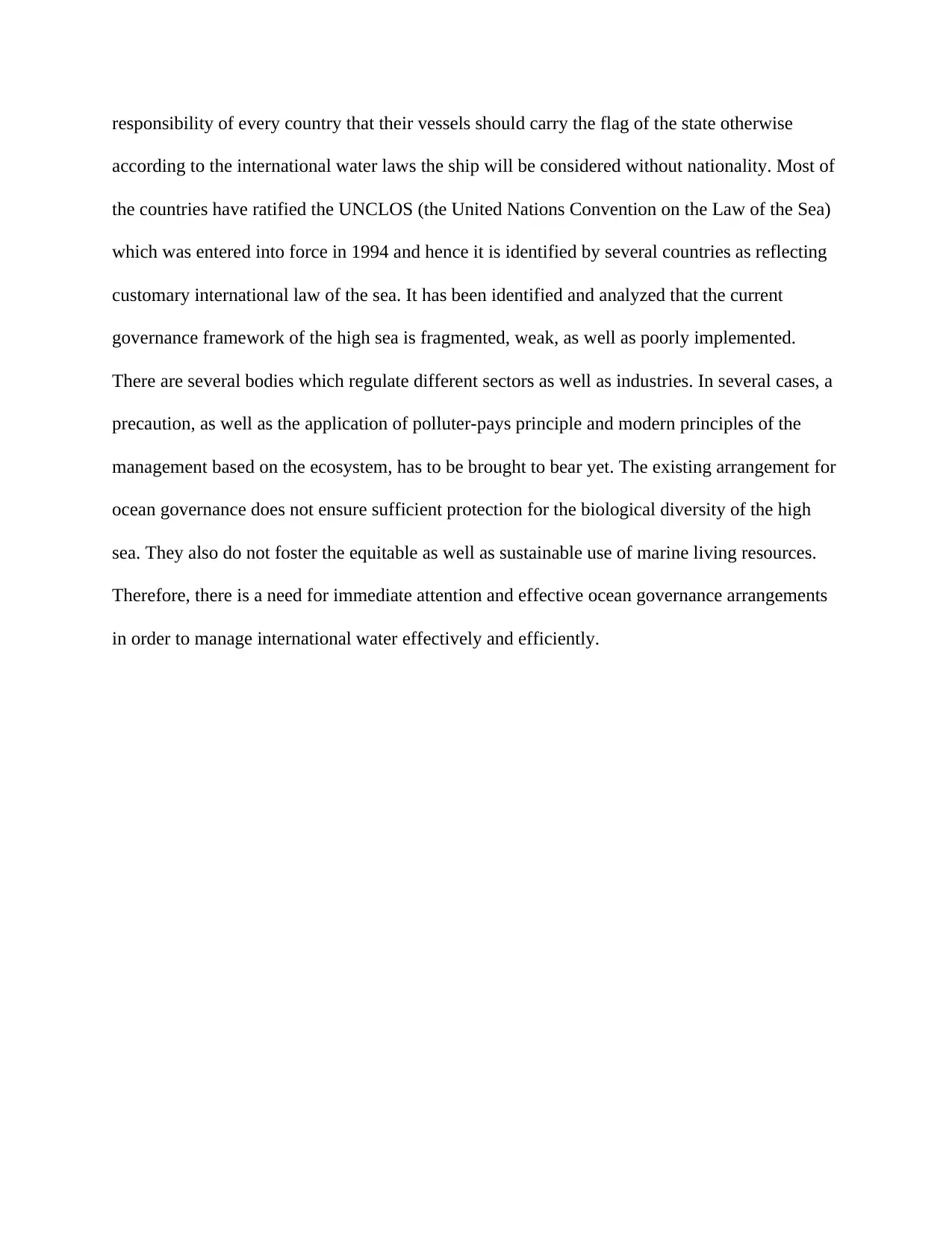
responsibility of every country that their vessels should carry the flag of the state otherwise
according to the international water laws the ship will be considered without nationality. Most of
the countries have ratified the UNCLOS (the United Nations Convention on the Law of the Sea)
which was entered into force in 1994 and hence it is identified by several countries as reflecting
customary international law of the sea. It has been identified and analyzed that the current
governance framework of the high sea is fragmented, weak, as well as poorly implemented.
There are several bodies which regulate different sectors as well as industries. In several cases, a
precaution, as well as the application of polluter-pays principle and modern principles of the
management based on the ecosystem, has to be brought to bear yet. The existing arrangement for
ocean governance does not ensure sufficient protection for the biological diversity of the high
sea. They also do not foster the equitable as well as sustainable use of marine living resources.
Therefore, there is a need for immediate attention and effective ocean governance arrangements
in order to manage international water effectively and efficiently.
according to the international water laws the ship will be considered without nationality. Most of
the countries have ratified the UNCLOS (the United Nations Convention on the Law of the Sea)
which was entered into force in 1994 and hence it is identified by several countries as reflecting
customary international law of the sea. It has been identified and analyzed that the current
governance framework of the high sea is fragmented, weak, as well as poorly implemented.
There are several bodies which regulate different sectors as well as industries. In several cases, a
precaution, as well as the application of polluter-pays principle and modern principles of the
management based on the ecosystem, has to be brought to bear yet. The existing arrangement for
ocean governance does not ensure sufficient protection for the biological diversity of the high
sea. They also do not foster the equitable as well as sustainable use of marine living resources.
Therefore, there is a need for immediate attention and effective ocean governance arrangements
in order to manage international water effectively and efficiently.
1 out of 7
Related Documents
Your All-in-One AI-Powered Toolkit for Academic Success.
+13062052269
info@desklib.com
Available 24*7 on WhatsApp / Email
![[object Object]](/_next/static/media/star-bottom.7253800d.svg)
Unlock your academic potential
© 2024 | Zucol Services PVT LTD | All rights reserved.




